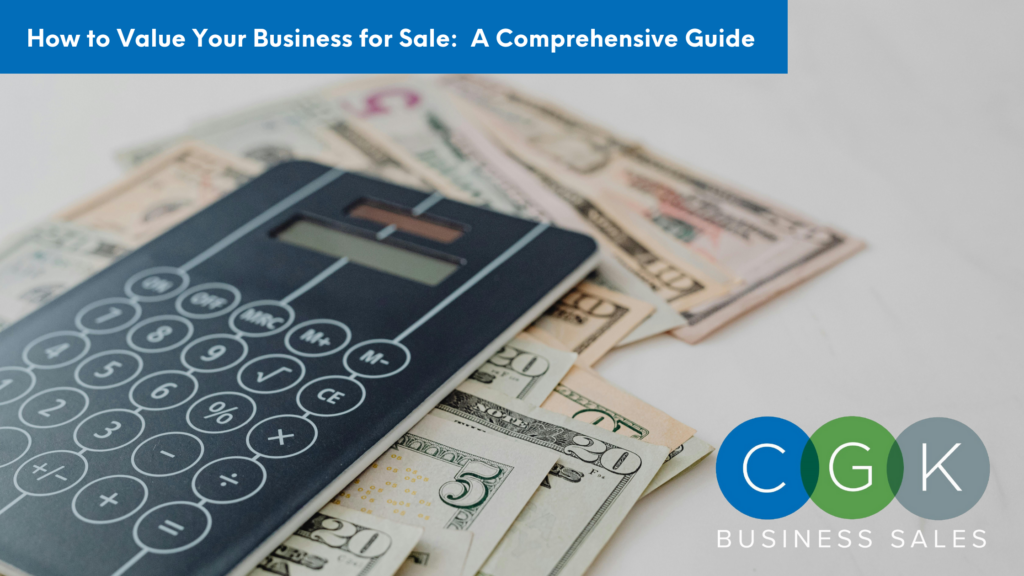When preparing to sell your business, determining its value is one of the most critical—and often complex—steps. An accurate valuation helps you, as a seller, show potential buyers the actual value of your business.
Working with skilled business brokers like CGK Business Sales makes the process smoother. They help your business attract qualified buyers and get the best value and terms.
Below, I will share the most effective strategies for valuing your business. I will highlight the importance of partnering with a business broker and provide tips for preparing you and your business for a successful sale.
Why an Accurate Valuation Matters
An accurate valuation isn’t just about setting a price—it’s about creating trust. Buyers need to know that the price aligns with your company’s actual worth, and sellers benefit from knowing they’re maximizing their return. An undervalued business risks leaving money on the table, while an inflated price can drive away serious buyers.
Experienced business brokers have strong industry knowledge and utilize proven valuation methods and market insights to help you price your business accurately. At CGK Business Sales, we provide expert guidance throughout the process, helping you navigate common pitfalls to achieve a valuation that reflects your hard work and your business’s value.
Key Methods for Valuing Your Business
In business valuation, there’s no one-size-fits-all solution. Different approaches depend on your company’s structure, industry, and financial history. Here are the most common methods:
1. Income-Based Valuation
An income-based valuation focuses on the present value of future earnings. If your business has stable, predictable cash flow, this method highlights its ability to generate income over time.
- Discounted Cash Flow (DCF): Projects future cash flows and calculates their present value.
- Capitalization of Earnings: Determines value based on current earnings divided by a capitalization rate.
For businesses with strong financial performance and growth potential, this approach is often the most appealing to buyers.
2. Asset-Based Valuation
This method calculates the value of your business’s tangible and intangible assets while subtracting liabilities. Businesses with significant physical assets, like real estate, equipment, or inventory, find it most useful.
- Book Value: Considers the assets listed on your balance sheet.
- Liquidation Value: Estimates what your assets would sell for if the business closed.
Asset-based valuation may be the best fit if your business has strong tangible assets but inconsistent income.
3. Market-Based Valuation
The market-based approach compares your business to similar companies that have recently sold. This method benchmarks your valuation against current market prices, reflecting what buyers are willing to pay.
An experienced business broker can access detailed transaction data and use this insight to position your business competitively.
Why Work with a Business Broker for Valuation?
Valuing your business is both an art and a science. Online calculators or DIY methods can provide rough estimates but often miss important details. They may not consider industry-specific factors, intangible assets, or buyers’ views.
This is where professional business brokers come in. Business brokers, like the experts at CGK Business Sales, provide:
- Accurate Valuation Methods: We combine proven approaches—income-based, asset-based, and market-based—to arrive at a fair, competitive value.
- Industry Insights: Our team understands market trends, buyer motivations, and how to position your business to stand out.
- Confidentiality and Expertise: Business brokers keep information private during the valuation and sales process. This way, your employees, clients, and competitors do not know until the sale is completed and the time is right.
A business broker doesn’t just put a price on your business—they help you tell the story of its value.
Preparing Your Business for Valuation
Preparation is key to achieving an accurate valuation. Here’s what business owners should prioritize and focus on:
- Organize Financial Records: Ensure your income statements, balance sheets, and tax returns are accurate and up to date.
- Streamline Operations: Efficient operations can make your business more appealing and increase its value.
- Highlight Intangible Assets: Brand reputation, customer loyalty, and intellectual property add significant value.
- Reduce Risk Factors: Address any legal, financial, or operational risks that might deter buyers.
A qualified business broker can help you with these steps and will make sure your business is ready to attract buyers and get the best value.
Conclusion
Valuing your business for sale is one of the most important steps in preparing for a successful exit. Familiarize yourself with the different valuation methods and work with a skilled business broker. This strategic approach will help you attract qualified buyers.
At CGK Business Sales, we specialize in guiding business owners through this process with precision and care. We’re here to help you achieve a successful and profitable sale from valuation to final negotiations. Are you ready to get started? Learn more about valuing your business and positioning it for a successful sale with our expert guidance. Contact CGK Business Sales today.

